THE CITIZEN KING
T IKE Stalin in the early thirties, Khrushchev Ld has proclaimed economic goals which are presented both as inspiration and as incentive to the Soviet population. Not only is Russia to become the most powerful nation on earth, but the Soviet citizen is to improve his living standard out of all recognition.
Of these grandiose plans the best opinions seem to be that the industrial and perhaps even the building programmes are feasible, but that. contrary to its sponsor's claims this will not give the USSR equality with the US except on the unlikely assumption that American production remains static or regresses. The agricultural plan is almost universally regarded as quite unreal. (It is only the latest of a whole series, and in every previous case the scepticism of outside commen- tators has proved more realistic than the trum- peted promises.) The Soviet economy's power for certain military purposes has already been demon- strated, and it has the capacity, properly handled, to improve its other aspects too. Our scepticism is likely to be roused by various charlatanries in .Khrushchev's speech. His claim . that there are more .students in the USSR than in Western Europe is simply false, and by a wide margin. His announcement that direct taxation will end is not the benefit it seems, for in a country with state monopoly every price contains a tax : and it was Lenin who said that direct taxation is the method fairest to the poorer sections of the com- munity. Yet this sort of phoneyness must not be allowed to make us forget the real strength and potentiality of the Soviet economic machine.
But, even the industrial plan has a number of dubious features. And, if they want to examine the relations between plans and results, students of planned economy will ask with interest what happened to the plan whose outline was adopted at the last Congress in February, 1956. The State Planning Commission failed to draft the directives in time for the preliminary discussions, but they were presented to the Congress and adopted, as `the Sixth Five Year Plan, 1956-1960.' The de- tailed plan failed to emerge, and in December, 1956, it was decided that the makeshift plan already in operation should be scaled down, and a brand new Sixth Five Year Plan prepared by mid- 1957. This, too, failed to appear and in September, 1957, the Sixth Five Year Plan was abandoned. The planning organs were instructed to prepare a new Seven Year Plan by July 1, 1958. This date, too, passed without any signs of the draft, but in September 'Theses' for• Khrushchev's present report were authorised. These appeared in November, and Khrushchev has now presented them. They still do not constitute a full-blown plan. The national economy is the only item of the present Congress's agenda. But then, agriculture was the only item on the agenda of last month's Central Committee plenum which actually de- voted much of its time to a welter of accusations against Bulganin, Malenkov and the fest of the `anti-Party group.' The Polish press has already written of expectations that the present Congress will see Khrushchev finally sort out his opponents. In his opening speech he said nothing about them, till he demolished them, in a rather sinister man- ner, in his very last sentence. It remains to be seen whether a Malenkov trial will be announced at once, or whether the First Secretary will content himself with strengthening his grip on the Central Committee, where Bulganin and others have evidently been hindering his plans for over a year. Stalin's last Congress, in 1952, was only the preparation for the purge, which got properly started two months later, and this might be the case again.
The combination of vast economic plans with an intense sharpening of the struggle for power reminds one rather of Stalin's 'Congress of Victors' in 1934, where he finally crushed his defeated opponents. Within four years, as Khrushchev himself has told us, he had shot a majority of those present. Today's Khrushchevite Victors may or may not be willing to trust him. The struggle for power will in any case go on. and with it the present Sino-Soviet rivalries. There is a tendency for commentators to treat these as superficial and vulgar compared' with all the statistics. But they are 'important, and may well decide the future of the Soviet Union, and so of the world.
All this is not to say that Khrushchev's position can be compared with Stalin's in any absolute sense. The logic of Soviet politics may force him to destroy his rivals in the old Stalinist style. But a good deal of his strength lies in his reliance on what is new in Soviet society—the new educated class, the loathing of the Secret Police, the hatred of the `conservatism'—i.e. Stalinism—with which Khrushchev is careful to brand his opponents. There is no sign, indeed, that Khrushchev means to do more than use these new forces to strengthen his own hand. But even absolute rulers are not free to do as they like. Khrushchev is now in an equivocal position. He is attempting to run an autocracy by consent. In the long run this has never proved possible in a literate society. It has often been tried in the past. Sometimes the experiment has gone on for some years; tottering from shift to shift, from 'liberalisation' which leads to pressure for real liberty, to repression which leads to explosions. Regimes of. this sort are always transitional, however impressive they may look at a given moment. The whole trend of the Soviet economy, of Soviet society in general, is towards something more glorious. Khrushchev's regime may well turn out to have been the Com- Munist equivalent of Louis Philippe's bourgeois Monarchy--a makeshift compromise between one-man rule and rule by consent. Khrushchev can be either a citizen or a king. The choice he makes will affect us all. Meanwhile every success his economic plans achieve makes the Soviet Union less suited to the party bureaucracy. Either way, as Marx said of capitalism, it is digging its own grave.











































 Previous page
Previous page